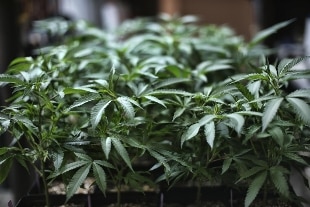Sentence of the Cassation opens to cannabis.
Here's what the law provides
Cannabis, the reactions to the decision of the Supreme Court: "Historical ruling, now the lawyer will wake up"
Maneuver, the news from plastic tax to cannabis
Maneuver, stop to cannabis light and protected energy market: it is brawl in the Senate classroom
Share
27 December 2019 It will no longer be a crime to grow cannabis in small quantities at home: the ruling of the joint criminal sections of the Cassation, or the highest organ of the Court, is an epochal ruling. It arrived on 19 December 2019. It was - the AGI reconstructed - resolved for the first time that "small-scale cultivation activities carried out in a domestic form do not constitute a crime".
Cultivation activities which - it is emphasized - "due to the rudimentary techniques used, the scarce number of plants and the modest quantity of obtainable product appear to be destined exclusively for the personal use of the grower".
Basically, those who cultivate for themselves no longer do it. Thus the thesis is advocated that the legal good of public health is in no way prejudiced or endangered by the individual marijuana user who decides to grow some plants for himself.
Kits for growing cannabis seeds on the balcony of the house are now widespread (in some cases they are also sold on the internet) but there were risks from a legal point of view, so far on a legal level there had never been a true opening in this direction.
In the past, the Constitutional Court has intervened several times on the issue, adopting a rigorous line, and so the jurisprudence has taken - after some isolated controversial judgments on the subject - a clear position. Establishing a simple principle: the cultivation of cannabis is always a crime, regardless of the number of seedlings and the active ingredient found by the authorities and even if the cultivation takes place for personal use. It was stated that "the conduct of cultivation of plants from which the active principles of narcotic substances are extractable" could "be evaluated as 'dangerous', that is, suitable for attacking the health of individuals for the sole fact of enriching the existing supply of matter first and therefore to potentially create more drug dealing opportunities ".
And so the Supreme Court, adapting to what has been clarified by the Council, has so far argued that the cultivation of marijuana, even if for very small doses (one or two plants) is always a crime, regardless of the state in which the plant is at the time of arrival of control.
Now - the reasons for the decision of December 19 are awaited - there has been a reversal of the principle established up to now. It is the joint criminal sections that have put a firm point by dictating a single line and standardizing the treatment for "weed" growers at home.
"The crime of growing narcotic drugs - reads the provisional maxim issued by the Court after the hearing on December 19 - can be configured regardless of the quantity of active ingredient that can be obtained immediately, since the conformity of the plant to the expected botanical type and its aptitude, also in terms of cultivation methods, to reach maturity and to produce narcotic substances "; "However - and here is the turning point - must be considered excluded, as it is not attributable to the scope of application of the criminal law, the cultivation activities of minimum dimensions, carried out in a domestic form and due to the rudimentary techniques used, the scarce number of plants, the very modest quantity of obtainable product, the lack of further indices of their inclusion in thewithin the drug market, appear to be destined exclusively for the personal use of the farmer ".
Reactions to the decision of the Supreme Court: "Historic ruling, now legislator will wake up"

